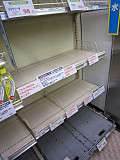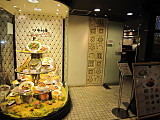Respect For Japanese Retailers (2011-03-26)
My observation:- Tainted spinach and milk near Fukushima have not driven the prices of vegetables from unaffected regions to go up in supermarkets and vegetable stores (ones near my home).
- The day when broccoli and cauliflower, amongst 11 other
vegetables, were found to have increased radioactive materials,
vegetables prices still remained the same as usual. At our
vegetable shop, the price of sought-after American broccoli actually DROPPED 40% while locally-grown
broccoli (not from farms in question) sold at the usual price (to the
cynics: imported and Japan broccoli do differ in size and texture and
are easy to tell the difference).
- On March 23 at the height of water scare when many people made a run for bottled water, their prices remained the same (and still are).
- Despite the very short supply of toilet paper and instant noodles
(among other things) in Tokyo area mostly due to makers sending the
bulk of their production to the 400,000 plus quake victims up north as
a priority, their prices have not increased a bit.
Rant: Speaking of price gouging, no industry is more flagrant
in doing so than the airline industry. My friend lamented that
immediately after the earthquake when she was looking to buy a ticket
for her son to go to Taiwan, a return ticket cost about US$1852, triple
the usual amount (she didn't get one at the end). To every
airline that profited from this disaster (or any other time when
there's an increased demand), shame on you!
P.S. Did you know that even if you were to eat the problematic
spinach (100gm a day) every single day for a full year, the radiation
you get amounts to less than a CT scan?
(Strict Japan's legal limit of iodine 131 and cesium on vegetables
are 2000 becquerels/Kg and 500 Bq/Kg respectively. The tainted
spinach recorded iodine 131 level at 3200-5700 Bq and cesium 500-790 Bq
on March 20)
Thoughts: Many governments (such as USA, Hong Kong, India and
Korea etc) are either stepping up their radiation check on imported
Japanese produce or banning it altogether (such as Italy), but none of
them ban the sale of cigarettes in their countries. INTERESTING.
Unrelated Figures: World Health Organization posted on their
website that "In the 20th century, approximately 100 million people
died world-wide from tobacco-associated diseases."
National Cancer Institute estimates 1690 deaths from thyroid cancer in USA in 2010 (unable to find worldwide data).
Back to top






